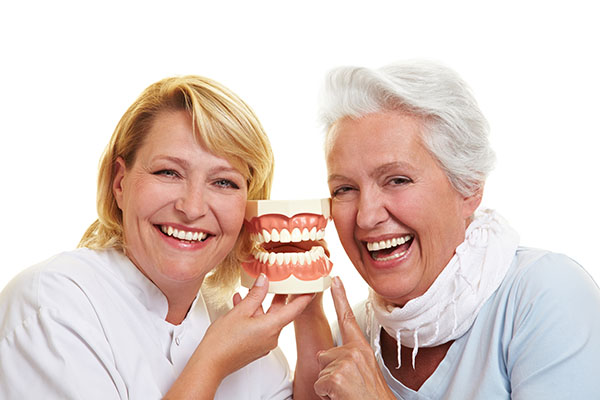Implant-Supported Dentures vs. Traditional Dentures

There are various options when it comes to choosing dentures, and implant-supported dentures are quickly gaining popularity. In some ways, implant-supported dentures surpass traditional dentures, while in other cases the opposite is true.
Whether implant-supported dentures or traditional dentures fit better with your lifestyle, it is important to weigh your options and educate yourself on each choice.
Denture choices: Implant-supported vs. traditional
Dentures vary in performance as well as appearance. Conventional dentures rely on dental adhesive and mouth muscles to stay in place. Traditional dentures sit on the gums, resting on the bone while implant-supported dentures use the bone for support.
Implant-supported dentures work by placing four implants into the upper or lower jawbone. A support bar usually accompanies these implants. Once the titanium implants have fused with the bone, the dentist will then place the permanent denture.
There are generally two types of implant denture: bar-retained and ball-retained. Bar-retained dentures attach by way of a snap-on mechanism to the bar that runs along the implants on the palate. Ball-retained dentures attach by small pegs at the end of each implant, corresponding to its matching snap-on space in the top of the denture.
Things to consider when choosing dentures
Effect on the bone
Conventional dentures sit on the bone. Since the bone is not being used, it begins to deteriorate. Bone density is lost, and any future ability to use the jaw fades away.
Inversely, implant dentures have a positive effect on the jawbone. The posts that are inserted into the jaw act like artificial tooth roots, keeping the jawbone alive and in use. For this reason, implant-supported dentures prevent the sunken facial appearance that can come from a loss of jawbone volume.
Chewing ability
Implant-supported dentures are directly attached to and supported by the implants in the bone, which gives the wearer the ability to chew a wide variety of foods. The bite force can be stronger with implant dentures, allowing the patient to chew on many foods that traditional dentures may not allow. Corn on the cob, chips and steak are only a few of the foods you would have to sacrifice with traditional dentures, but not with implant dentures.
Because they are not held in place with implants, the maximum bite force while wearing conventional dentures is much lower. This means you have to be a little more careful when eating while wearing traditional dentures. Dentists recommend only eating soft foods when wearing traditional dentures.
Speaking and smiling
The stability provided by implant-supported dentures allows for easier speaking and enunciation of words, whereas traditional dentures might cause a subtle lisp since they are not as well attached. Both dentures will need to be removed each night to stave off bacteria and give the mouth a break.
Implant-supported dentures appear more natural than traditional dentures. Adhesive-supported dentures can fall throughout the day and become uneven.
Are you currently considering dentures?
If you are currently in need of dentures and are considering implant-supported dentures, we invite you to contact our office today to schedule a consultation with a dentist and help you determine which type of dentures is right for you.
Request an appointment here: https://smilesonmichigan.com or call Smiles On Michigan at (312) 509-9492 for an appointment in our Chicago office.
Check out what others are saying about our services on Yelp: Read our Yelp reviews.
Recent Posts
A smile makeover may be the answer for people who are embarrassed to show their teeth. A makeover consists of one or more dental procedures that treat or cover up imperfections with the gums or teeth. There are various methods that a dentist may use to change the appearance of one's smile, and they range…
Invisalign® is a discreet teeth-straightening method. Research shows that many people prefer this method to traditional braces. The clear aligners offer a more comfortable way to align teeth. Knowing when to choose Invisalign can help you prepare for your upcoming appointments.The metal wires and brackets of traditional braces can cause scrapes and holes in the…
Dental bonding is a reversible dental procedure that involves using a composite resin material to rebuild and restore teeth. The composites used can be matched with the color of the patient’s teeth, allowing restorations made with them to blend in.Dental bonding has cosmetic and restorative uses in dentistry. Unlike other popular restorations dentists use, its…
Wondering what a cosmetic dentist can do for your smile? Read on to learn more. A great smile can be a big self-esteem booster and a way to leave good first impressions. However, not all people have an aesthetically pleasing smile. Fortunately, a cosmetic dentist can help you improve the appearance of your teeth, gums,…